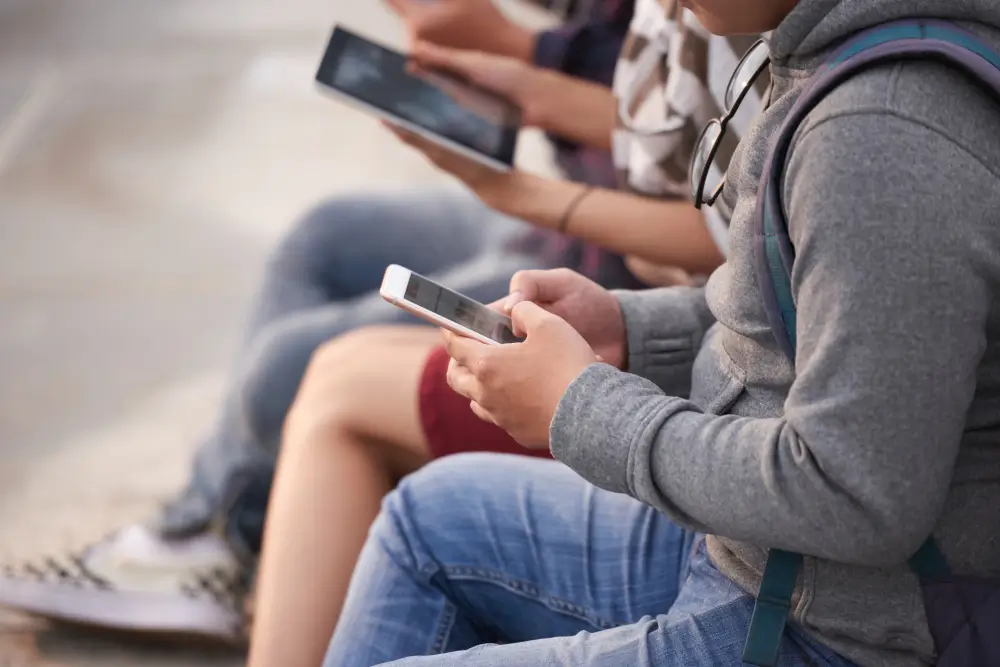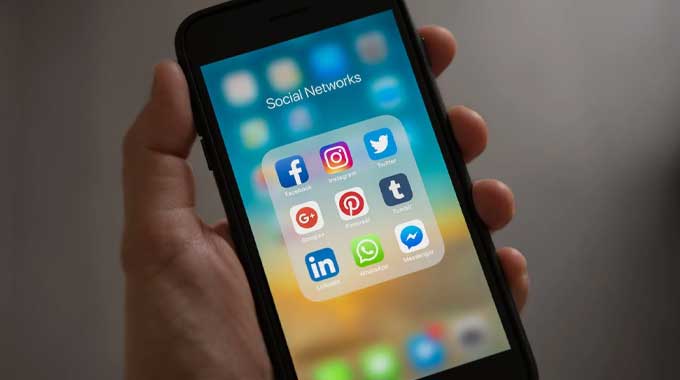
Updated and Fact-Checked June 2024 by: Christine Zambos, LMFT
Update list:
- Added new insights regarding why teens get addicted to their phones based on new research.
- Added statistics on teen phone usage
- Updated old statistics.
- Added new tips for parents to help teens suffering from phone addiction
- Added new signs of teen phone addiction based on new approaches.
Teenagers of today are growing up in a new frontier of technology, with easier access than ever to smartphones and the digital world. It can be tough for parents and adults to distinguish between what is a “normal” amount of cellphone screen time for a teenager, and when it has become an addiction.
Phones can certainly be used as a helpful tool to connect socially, read new information, manage their health (sleep trackers, nutrition, etc) and help with studies. For teenagers, smartphones are also a way to escape from reality. Communication between teens has become less face to face, and more digital interaction through accounts, posts, Snapchat and comments.
A small amount of the brain chemical dopamine is released by the brain when cell phones are used. This can lead to an impulse-control problem and phone addiction, especially for the already vulnerable teenage brain.
What is Teen Cell Phone Addiction?

Cell phone addiction puts into question many stereotypical assumptions about addiction. While parents once worried about their teens falling into substance abuse and the possibility of drug addiction, recently, the addiction landscape has shifted. Parents now also worry about their teenagers having too much screen time and their risk of developing a cell phone addiction.
On average, teens have been found to spend around seven hours a day on their mobile phones, compared to adults who have a screen time of around four hours a day. But teen cell phone addiction is so much more than talking and texting. For teenagers, cell phones open a gateway to an escape from reality, it includes games, apps, and the biggest time consumer of them all, social media.
When it comes to interaction amongst peers, teens now like to admire and approve, comment, and criticize. They aren’t always communicating one on one but instead are constantly checking for responses and likes to their posts and others.
Smartphone addiction is real and the more that teenagers are using the apps, the more their behavior is reinforced by the dopamine that is induced through their mobile phone usage.
Teen Phone Addiction By the Numbers
Smartphone addiction is real and a growing public health problem. Teenage cell phone addiction is defined as a behavioral addiction and can affect day-to-day life. Cell phones are a large part of the lives of teens. One US study found 83% of teens use a phone daily, and an addiction rate of 37% , with an average of 7-9 hours spent on screen time.
Why Are Teens Addicted to Their Phones?

Teenagers tend to be naturally more sociable as they navigate their sense of self and the life around them. Interacting and socializing with people is a part of this process. The evolution of smartphones has made this more possible than ever. Teens can easily communicate through a variety of social media platforms and get or give immediate responses.
Teens are met with positive interactions, feedback and instant messages, releasing the neurotransmitter dopamine—responsible for pleasure, reward processing and habit forming.
Research has found that excessive cell phone usage, specifically social media, can cause similar chemical responses in the brain that are caused by drug addiction.
Similar to a high from drugs, as the use of cell phones and social media increases, the more engagement a user craves. This begins a reward cycle that can be hard to break without intervention from parents or adults.
Although any teen has the potential to develop an addiction to their cell phone, there are a few risk factors that may heighten the risk of your teen spending too much time on their phone:
- Stress
- Depression
- Anxiety
- Personality (specifically if they tend to be more impulsive)
- Social isolation
- Lack of involvement in extracurricular activities
Signs Teens are Addicted to Their Cell Phone

Like other behavioral addictions, there are certain signs of teen cell phone addiction. By educating yourself on the potential signs it will be easier to be aware of these red flags and help your teen so it does not become more serious or follow them into adulthood.
- Constantly on their phone
- Distress when they are without their phone, even for a short period of time
- Withdrawal from activities they once enjoyed
- Mental health problems such as anxiety or depression
- Lowered academic performance
- Less in in-person interactions
- Impatient, angry, or irritable
- Obsessed with documenting everything (selfies, posting everything on their snap story, status updates)
- Trouble sleeping even if they feel tired
- Lying about their phone usage
- Trouble cutting back on phone use even if they want to or are trying
- Neck pain known as “tech neck”
- Headaches or migraines from eye strain.
If you believe teenage cell phone addiction is affecting someone you love, it is important to know that you are not alone and help is available. Teen smartphone addiction is extremely common, in fact around 50% of teenagers believe that they have a cell phone addiction and although more than a third of teenagers try to reduce the amount of time that they spend on their cell phones, the majority of them are unable to do so.
How Does Phone Addiction Affect The Teen Brain?
Many of us likely overuse phones which can cause problems in various areas of life and lead to mental health issues if left unchecked. This is heightened in adolescents because they are in a vulnerable stage of brain development.
During adolescence, the regions of the brain such as the prefrontal cortex and limbic system are still growing. These key areas are responsible for impulse control, reward processing and positive reinforcement—making them particularly sensitive to the pleasure released during time spent on their phones.
Social Media Use

The generations that have grown up with social media platforms and regular cell phone use are at risk of developing emotional and social challenges that have not been encountered before. While teenagers once worried about rumors being spread amongst peers or gossip circulating in their schools, many now live in fear of public shaming online.
Users can now have hundreds of followers on different platforms and sharing online is as simple as pressing a single button. Research has found that 62% of teenagers use some form of social media every day while only one-third of teens say that they actually enjoy their use of social media ‘a lot’.
How Social Media Affects Mental Health
Research has found that a teen’s use of social media is closely related to an increase in low levels of life satisfaction and teen depression. Although the effects of social media can be worrying for everyone, the impact on teens is even more concerning.
The brain of a teenager is still developing in functions such as emotional regulation, self-control, impulse control, decision-making, and cognitive controlling, this combined with the constant flow of new content can overwhelm a teenager’s ability to manage and process the input.
One study that looked at 13-year-olds and their social media use found that participants who reported checking their social media from 50 to 100 times every day were found to be 37% more distressed compared to individuals who checked their social media a few times a day. Some of the ways in which social media can contribute to teen anxiety and depression may include:
- Enduring public criticism
- Comparing themselves to beauty standards that are shown on social media
- Jealousy or envy over the lives of people online
- Obsessive over whether they have enough likes, comments, or shares
- Having the fear of missing out on certain events
Effects of Phone Addiction on the Teen’s Life

Teen cell phone addiction can have many negative effects on a teenager’s day-to-day life. Cell phone addiction has been linked to a decrease in participating in extracurricular activities as well as a decline in school grades, of kids found that the use of their smartphone negatively impacted their schoolwork. Below are the possible risks of a cell phone addiction and the consequences that may harm teenagers well being and safety.
Mental Health
As we have discussed, the teenage brain is still developing and is therefore more vulnerable to certain things that could possibly lead to mental health issues. Studies have found that teenagers who spend large amounts of time on social media apps are at risk of suffering from higher levels of mental health issues. For example, anxiety levels can increase when a teenager’s phone is not readily available.
A recent study that surveyed over 300 university students aimed to investigate whether high engagement with mobile phones affected the user’s well-being. They found that individuals who described themselves as displaying addictive-like behaviors towards their phones scored higher on anxiety and depression scales.
Physical Health
Excessive screen time can also affect a teenager’s physical health. The blue light that is radiated from a phone can pose risks of developing eye problems. Phone addiction can also lead to negative health consequences, including:
- Blurred vision or eye strain from staring at a small screen
- Chronic strain on the neck from constantly looking down at a phone
- Eye fatigue
- Headaches and migraines
Sleeping Behaviors
When a teen is going to bed, the location of their phone can be an indicator of potential smartphone addiction. 74% of teenagers say that they use their cell phones after their bedtime.
Cybersecurity
Phone and internet addiction are linked to certain cybersecurity behaviors. Cybersecurity basically means the protection of your personal information, things that could happen include online scams or identity theft. It is always important to educate your teen about cybersecurity.
Cybercriminals are all over the internet and at times it can be difficult to judge whether someone on an online forum is to be trusted or not. Additionally, teenagers are at risk of cyberbullying. Other users are able to comfortably hide behind a screen and send harmful comments or information to others.
Road Safety
We are all aware of the dangers of driving while talking or texting on the phone. Unfortunately, teenage cell phone addiction increases the likelihood of these dangers happening. When teen drivers are using a phone, they are unable to direct all of their attention to the road.
What To Do If A Teen is Addicted to Their Phone?

If you are concerned your teen is spending too much time on their cell phone and experiencing the signs above, there are a variety of ways to set limits and healthy boundaries. Some cell phone rules that a parent may consider could include:
- Set time limits on your teen´s cell phone use
- Restrict screen time 1-2 hours before bedtime
- No cell phones at the dinner table
- Set periods or days as a family where you go “tech-free”, participating in other activities together that get everyone in the home off their phone
- Use parental controls on social media platforms to set time restrictions on certain apps
- Have them turn off notifications so their screens are not constantly flashing
- Teach them about the health consequences of spending too much time on their mobile phones
As a parent, you should understand your child more than anything anyway and you are aware of what preventive measures are appropriate to use. Although anyone with a mobile phone is at risk of developing a mobile phone addiction, teenagers are at a heightened risk, especially without parental supervision.
When to Seek Help?
If your adolescent’s excessive phone dependency persists despite trying these preventative steps,or if they are dealing with an underlying mental health issue that is fueling their frequent phone use, it may be essential to seek help from a mental health expert.
If you suspect your adolescent is experiencing cell phone addiction or other impulse control issues, Clearfork Academy offers a knowledgeable and understanding staff dedicated to treating behavioral addictions and impulse control problems. Reach out to Clearfork today to discover how we can assist you.
Treatment at Clearfork
Clearfork Academy is a residential treatment center for teenagers. We provide substance abuse disorder treatment and help for teens who are experiencing mental health concerns, such as depression or anxiety. Our outdoor adventure program serves adolescent girls and boys from the ages of 13 – 17. We provide a structured and supportive environment for youth who may be struggling with their mental, physical, and social bonds of mental health and chemical dependency.
Our program was designed for today’s teenagers and each module that they encounter reflects both our core values and therapeutic approaches that have been proven to be effective. We offer a medical detox which is essential for a healing process to begin. Individualized treatment plans are created to ensure a quick recovery and an easy transition to our residential programs.
Our residential treatment helps teenagers recover from drug or alcohol addiction in a safe and comfortable space on a scenic Texas Ranch. We also offer intensive outpatient treatment which is perfect for those teenagers who may be in the early stages of their substance abuse or addiction and need ongoing guidance and support to help avoid any long-term issues.
If you want to find out more about how we at Clearfork Academy can help you or a loved one, then contact us today. Remember, we are here to help you.
Sources
Bhanderi, D. J., Pandya, Y. P., & Sharma, D. B. (2021). Smartphone Use and Its Addiction among Adolescents in the Age Group of 16-19 Years. Indian journal of community medicine: official publication of Indian Association of Preventive & Social Medicine, 46(1), 88–92.
Kim J. H. (2021). Factors Associated with Smartphone Addiction Tendency in Korean Adolescents. International journal of environmental research and public health, 18(21), 11668.
Austin Davis, LPC-S
Founder & CEO
Originally from the Saginaw, Eagle Mountain area, Austin Davis earned a Bachelor of Science in Pastoral Ministry from Lee University in Cleveland, TN and a Master of Arts in Counseling from The Church of God Theological Seminary. He then went on to become a Licensed Professional Counselor-Supervisor in the State of Texas. Austin’s professional history includes both local church ministry and clinical counseling. At a young age, he began serving youth at the local church in various capacities which led to clinical training and education. Austin gained a vast knowledge of mental health disorders while working in state and public mental health hospitals. This is where he was exposed to almost every type of diagnosis and carries this experience into the daily treatment.
Austin’s longtime passion is Clearfork Academy, a christ-centered residential facility focused on mental health and substance abuse. He finds joy and fulfillment working with “difficult” clients that challenge his heart and clinical skill set. It is his hope and desire that each resident that passes through Clearfork Academy will be one step closer to their created design. Austin’s greatest pleasures in life are being a husband to his wife, and a father to his growing children. He serves at his local church by playing guitar, speaking and helping with tech arts. Austin also enjoys being physically active, reading, woodworking, and music.





